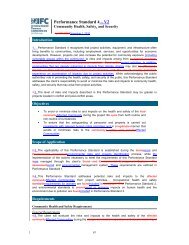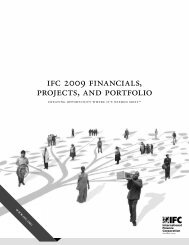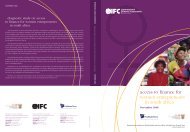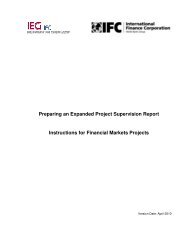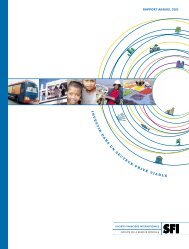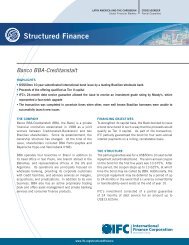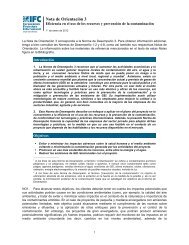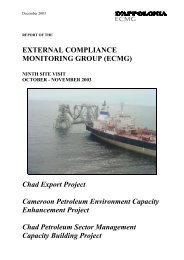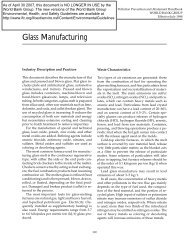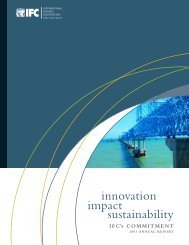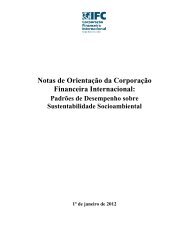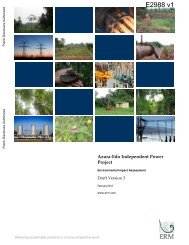Corporate Governance for Banks in Southeast Europe: Policy - IFC
Corporate Governance for Banks in Southeast Europe: Policy - IFC
Corporate Governance for Banks in Southeast Europe: Policy - IFC
Create successful ePaper yourself
Turn your PDF publications into a flip-book with our unique Google optimized e-Paper software.
exam<strong>in</strong>ations permit a systematic evaluation of a bank’s<br />
Meet<strong>in</strong>gs with Bank Boards<br />
governance is uncerta<strong>in</strong>. It is common that supervisors<br />
only meet with boards when there is a problem.<br />
“We have found…that the supervisor…does<br />
Furthermore, local supervisors rarely have a clear view not have <strong>in</strong>teraction with the board; they<br />
of the structure of responsibility and authority with<strong>in</strong> have a lot of <strong>in</strong>teraction with management.<br />
group structures, which makes it difficult <strong>for</strong> them It is surpris<strong>in</strong>g…how many supervisors do<br />
to <strong>for</strong>m a global picture as to where the weaknesses not meet with the board on a regular basis.”<br />
might lie <strong>in</strong> the group. At present, there is no clear<br />
Esad Zaimovic, Montenegro<br />
concept of what criteria are to be used and how<br />
to monitor the process of implementation of good<br />
governance. Supervisors’ ability to make mean<strong>in</strong>gful<br />
comparisons of governance between banks is also<br />
limited by the lack of a standardized supervisory report<strong>in</strong>g process.<br />
F<strong>in</strong>ally, some concern has been expressed over the tendency of regulators to rely on checklists and box-tick<strong>in</strong>g<br />
exercises <strong>for</strong> their monitor<strong>in</strong>g responsibilities. Checklists and box tick<strong>in</strong>g are often criticized, though they have<br />
the merit of ensur<strong>in</strong>g that all issues of relevance are at least considered. Their weakness is that the issues may<br />
not be exam<strong>in</strong>ed <strong>in</strong> sufficient detail to reveal deficiencies or risks. Nor is it clear how <strong>in</strong>dividual components<br />
on a checklist may <strong>in</strong>terrelate or how they affect the risk of the bank. Ultimately, checklists can work if<br />
applied <strong>in</strong>telligently by <strong>in</strong>dividuals who understand the substance. Gett<strong>in</strong>g at the substance requires time and<br />
may call <strong>for</strong> additional tra<strong>in</strong><strong>in</strong>g <strong>for</strong> supervisory staff.<br />
Recommendations:<br />
Monitor<strong>in</strong>g bank governance: The monitor<strong>in</strong>g of bank governance should be <strong>for</strong>malized and strengthened.<br />
The basis of any monitor<strong>in</strong>g should be an agreed standard of governance. Standardized frameworks <strong>for</strong> the<br />
analysis of banks will make evaluations more rigorous and allow <strong>for</strong> <strong>in</strong>terbank comparison. Supervisors should<br />
themselves be held accountable and report on their own progress <strong>in</strong> enhanc<strong>in</strong>g governance <strong>in</strong> the bank<strong>in</strong>g<br />
system.<br />
Meet<strong>in</strong>gs with bank boards: Supervisors should meet regularly with boards and chief risk officers, or<br />
equivalent, dur<strong>in</strong>g visits and <strong>in</strong>spections. This <strong>in</strong>cludes subsidiary boards. Supervisors should require the full<br />
board to meet locally at least once a year. The supervisor should meet annually with the board to discuss<br />
current issues, even when the bank is <strong>in</strong> satisfactory condition. These meet<strong>in</strong>gs should be conducted locally.<br />
Understand<strong>in</strong>g home-subsidiary relations: To vary<strong>in</strong>g extents, supervisors place confidence <strong>in</strong> the ability<br />
of head offices to oversee their local subsidiaries. This trust should not turn <strong>in</strong>to bl<strong>in</strong>d confidence. Supervisors<br />
need to develop the capacity to look through to the parent’s control systems. Supervisors should be aware<br />
of and understand the scope of report<strong>in</strong>g and oversight provided by head offices, <strong>in</strong> part by review<strong>in</strong>g the<br />
nature and configuration of key reports. If obvious gaps exist, it may require dialogue between the supervisor,<br />
the parent and the subsidiary and understand<strong>in</strong>g of the issue or risk by all parties.<br />
<strong>Corporate</strong> <strong>Governance</strong> <strong>for</strong> <strong>Banks</strong> <strong>in</strong> <strong>Southeast</strong> <strong>Europe</strong> <strong>Policy</strong> Brief 53



